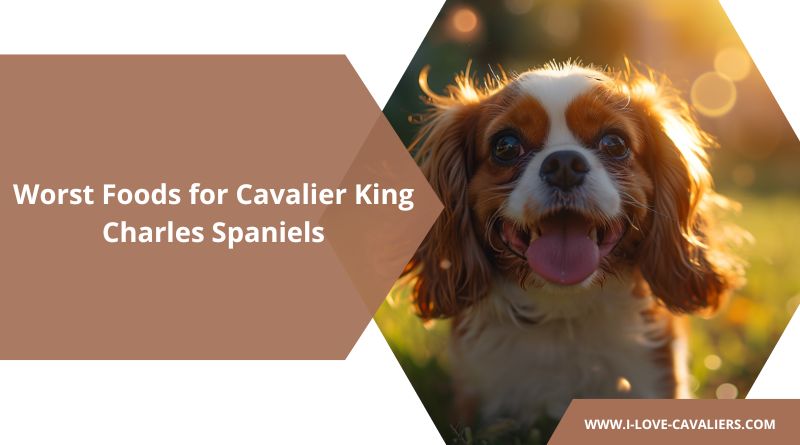I know, it’s tempting to slip your Cavalier a bit of whatever you’re having, yet some common foods can jeopardize their health, even if they gaze at you with those big, soulful eyes.
Navigating the do’s and don’ts of your Cavalier’s diet might feel like a daunting quest. Indeed, certain foods that are harmless to humans can be harmful, or even lethal, to your four-legged friend.
So, let’s get to the meat of the matter and explore the worst foods to avoid and keep your Cavalier King Charles Spaniel’s tail wagging safely.
Understanding the Unique Dietary Needs of Cavaliers
Cavaliers have a few health concerns to watch out for. Mitral Valve Disease (MVD) is the big one—it impacts over half of Cavaliers by the time they’re 5 and nearly all by the age of 10, according to veterinary studies.
Then there’s syringomyelia, a condition that can cause discomfort and requires careful management. Of course, we can’t forget about obesity and dental issues, typical for these charming pups.
Ever wondered how what they eat affects these conditions? Let’s break it down:
- MVD and Obesity: Too many treats or foods high in fat can lead to weight gain, putting extra strain on your Cavalier’s heart.
- Syringomyelia: This neurological condition can be worsened by nutrient deficiencies, so a balanced diet is key.
- Dental Health: Cavaliers need kibble that helps scrape plaque off their teeth, plus regular dental checks.
You might think, “How can I make sure my Cavalier gets everything they need?” Well, they thrive on a mix of high-quality protein, complex carbohydrates, healthy fats, and the right blend of vitamins and minerals.
Here’s a quick rundown of what to look for:
- Protein: Essential for muscle maintenance.
- Carbs: Focus on complex carbs for long-lasting energy.
- Fats: Healthy fats like omega-3s support coat health.
- Vitamins & Minerals: Keep their immune system strong.
Foods to Avoid for Your Cavalier
Toxic Foods
#1 Chocolate – You’ve heard it before, but it bears repeating: chocolate is a no-go for your Cavalier! It contains theobromine, which is safe for humans but lethal for dogs. Even a small amount can cause vomiting, diarrhea, and severe agitation. In case of chocolate ingestion, rush to your vet at once!
#2 Grapes and Raisins – These fruits may seem like a healthy snack, but they’re quite the opposite. They contain toxins that remain a mystery to scientists but can lead to acute kidney failure in dogs. Watch for symptoms like lethargy and depression, and err on the side of caution by keeping these treats out of paw’s reach.
#3 Onions and Garlic – Savory to us, but dangerous to them! All forms, whether raw, cooked, or powdered, can lead to oxidative damage in red blood cells and cause anemia. Make sure to keep these foods well away from your furry friend.
#4 Xylitol – Found in sugar-free products, this sweetener can plummet your dog’s blood sugar and cause liver failure. Symptoms include vomiting, lethargy, and loss of coordination. Double-check your pantry – you may be surprised where xylitol is hiding.
Unhealthy Foods
#5 High-fat Foods – Fatty foods can lead to weight problems and pancreatitis. Since these pups are prone to heart issues, keep the fat content low in their diet.
#6 Salty Foods – Too much salt can lead to heart disease, which Cavaliers are especially at risk for. Look out for signs of salt poisoning like vomiting, diarrhea, and bloating.
#7 High-sugar Foods – Beware of the sweet stuff! Sugar can contribute to dental issues and diabetes. Keeping up with regular dental care routines and opting for a sugar-free diet will keep those pearly whites safe.
Dangerous Human Foods
#8 Alcohol – Just as it’s not a good idea for you, alcohol is a terrible choice for your dog. It can lead to alcohol poisoning, symptoms of which include difficulty breathing and seizures.
#9 Caffeinated Beverages – These drinks can overstimulate your dog’s cardiovascular and nervous systems. Be mindful as caffeine poisoning is dangerous and can be fatal.
#10 Bones and Pits from Fruits – They might seem like a natural chew toy, but they’re actually a choking hazard and can cause intestinal issues. Better to be safe with vet-approved chew treats!
Guidelines for a Healthy Cavalier Diet
Ever wondered what’s really good for your Cavalier King Charles Spaniel? Let’s get right to it!
Quality is Key: Start with high-quality dog food where meat is the main ingredient. Whole meats and meat meals, like chicken or fish, should be at the top of the ingredient list, not fillers like corn or soy. Artificial colors or preservatives? Nope, none of those, please. Your pal deserves better!
Portion Control: Did you know Cavaliers are prone to put on extra weight if not monitored? It’s true! The solution is easier than you think: portion control.
Here’s a quick guide:
- Weight: Tailor portions to your furry friend’s weight
- Age: Puppies chow down more than adults
- Activity Level: A couch potato eats less than a frisbee champ
To keep the chub at bay, you’ll need to measure those kibbles.
Supplements & Treats: Show your Spaniel you care with treats that love them back:
- Joint Health: Glucosamine and chondroitin are great for those royal joints.
- Heart Health: Omega-3s keep their ticker in top shape.
- Coat Quality: Flaxseed or fish oil for that silky fur look.
Remember, treats should be just that – occasional and not a meal substitute.
Healthy Treat Options:
- Veggies: Carrot sticks or green beans can crunch the hunger away.
- Fruits: Blueberries for an antioxidant boost – just remember, no grapes or raisins!
